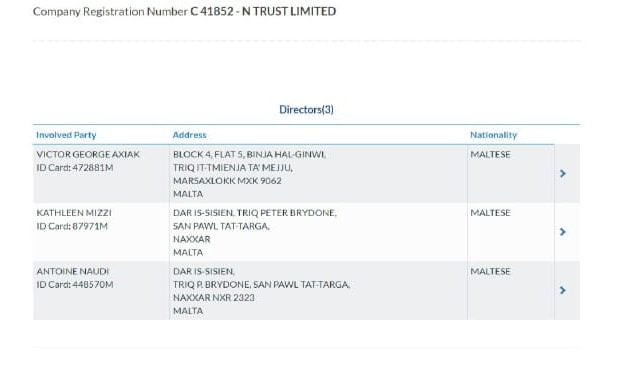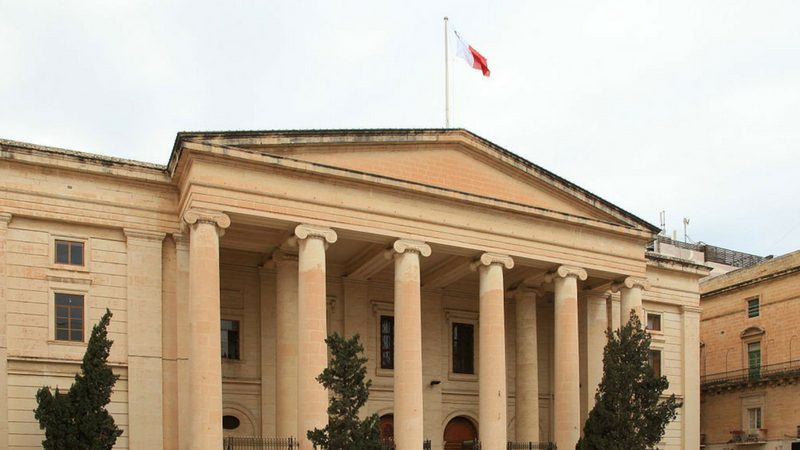Such was the rush to appoint the new judges and magistrates yesterday, that new Magistrate Victor Axiak still appeared as a Director of his office’s nominee company N Trust Limited on the Registry of Companies.
Under Maltese law, a magistrate is barred from exercising any profession, business, or trade. Doing so is in the code of ethics and is one of the aspects the Judicial Appointments Committee (JAC) is meant to vet before inclusion in the list of persons “eligible” for selection by the Prime Minister.
It is unclear as yet whether he has resigned.
The company was named in the Paradise Papers leaks and has a number of active nominee clients including iGaming related businesses and international holding companies.

The other two magistrates appointed as judges on Thursday, Joanne Vella Cuschieri and Aaron Bugeja, were also previously found to be still registered as company secretaries of commercial entities well after their appointment.
Prime Minister Joseph Muscat has defied the recommendations of the Venice Commission, paying lip service to its recommendations and making no commitment on when Malta will implement them.
Muscat on Thursday rushed to appoint six new members of the judiciary in a last-minute swearing in ceremony after the court welcomed NGO Repubblika’s request for their case to be heard with urgency to stop the government from appointing more members of the judiciary before the Venice Commission reforms were introduced.
The Venice Commission report raised a number of concerns about judicial independence in Malta particularly the vetting and appointment process of new judges and magistrates. This due to the fact that practically unfettered decision lies in the hand of the government and ultimately, the Prime Minister. The report which focuses on democracy and the rule of law stated that the current judicial system “falls short of ensuring judicial independence and [that] further steps are required”.
It added that “the principle of independence of the judiciary requires that the selection of judges and magistrates be made upon merit and any undue political influence should be excluded.”
The current appointment system uses the JAC which receives and vets applications by lawyers for inclusion in a pool of candidates that are “eligible” to be appointed as magistrates or judges. By default, all magistrates are eligible for appointment as a judge. The Prime Minister then has unfettered power to select persons from that list (or the current magistrates) and appoint them to the bench. The law also grants the Prime Minister the power to ignore the JAC’s pool altogether in certain instances.
All six new appointees were handpicked by Muscat. Apart from magistrate Bugeja – who handled the Egrant inquiry which remains unpublished – and Vella Cuschieri, magistrate Francesco Depasquale will also be appointed judge.
Four other female magistrates are more senior than Depasquale: Audrey Demicoli (most senior), Doreen Clarke, Claire Zammit Starfrace and MarseAnn Farrugia. This raises the question of why the Prime Minister has overlooked them.
As well as Axiak, Bridget Scicluna and Nadine Lia were also appointed magistrates. Lia’s appointment was controversial, as she is the daughter in law of the Prime Minister’s lawyer, Pawlu Lia, who was also one of the two lawyers who drew up the terms of the Egrant inquiry.
“As far as we know today’s has been a ceremony with a record bulk appointment of Judges and Magistrates in a single event, organised hurriedly and as a result of a panicked reaction to the risk a Court might halt the Government’s explicit intention of stuffing the judiciary with members of its choice,” Repubblika said in a statement.
In this case, the First Hall of the Civil Court found that it was not necessary to halt the government’s plans, as the decision taken by the government to appoint the selected magistrate and judges could be reversed, the NGO added.
While the government tried to pass the court’s decision off as some kind of victory or that it somehow had the Courts’ sanction, in practice, it is highly unlikely for the Maltese Courts to ever issue a prohibitory injunction against the government – particularly where a decision is reversible and there is no immediate damage.
A statement by the Department of Information, the government’s communications arm, also attacked lawyers and Opposition MPs Jason Azzopardi and Simon Busuttil for filing the case on behalf of their client Repubblika.
Malta Gov approves new judicial posts in spite of recommendations by Venice Commission, European Parliament & Commission for the Reform of Justice System to change appointment system to ensure judicial independence & rule of law @VeniceComm @EP_Justice https://t.co/woaJIRa09z
— aditus foundation (@aditusNGO) April 25, 2019
Human Rights NGO Aditus also drew attention to the new appointments “in spite” of recommendations by the Venice Commission and other entities that are supposed to ensure “judicial independence and rule of law”.
Giovanni Bonello, former European Court of Human Rights judge, has spoken out the need for the courts – the last wall of defence – to protect democracy and the rule of law. He said that the Maltese judiciary has not been very supportive of human rights from day one, when they were introduced in 1961.
“There are some very good and courageous people, with great integrity, but there are some who are just there to rubber stamp whatever the government expects them to rubber stamp,” he told The Malta Independent on Sunday. He said the way appointments to the judiciary were made in Malta, was one of the main reasons.












